Nissan Patrol: Difference between revisions
No edit summary |
|||
| Line 141: | Line 141: | ||
|aka=Nissan Patrol |
|aka=Nissan Patrol |
||
|production=1987–1998 |
|production=1987–1998 |
||
|class=Full-size [[ |
|class=Full-size [[Jeep]], [[Pickup]] |
||
|body_style=5-door [[4x4]]<br>2-door [[Pickup]]<br>4-door [[Pickup]] |
|body_style=5-door [[4x4]]<br>2-door [[Pickup]]<br>4-door [[Pickup]] |
||
|engine=3.0L [[Nissan RB engine|RB30S]] I6<br> 4.2L [[Nissan TB engine|TB42E]] I6<br>4.2L [[Nissan TD engine|TD42]] Diesel<br>2.8L [[Nissan RD engine|RD28T]] Diesel<br> 4.2L [[Nissan TB engine|TB42S]] I6 |
|engine=3.0L [[Nissan RB engine|RB30S]] I6<br> 4.2L [[Nissan TB engine|TB42E]] I6<br>4.2L [[Nissan TD engine|TD42]] Diesel<br>2.8L [[Nissan RD engine|RD28T]] Diesel<br> 4.2L [[Nissan TB engine|TB42S]] I6 |
||
| Line 165: | Line 165: | ||
|aka=Nissan Patrol |
|aka=Nissan Patrol |
||
|production=1997-present |
|production=1997-present |
||
|class=Full-size [[ |
|class=Full-size [[Jeep]], [[Pickup]] |
||
|body_style=5-door [[SUV]]<br>2-door [[Pickup]]<br>4-door [[Pickup]] |
|body_style=5-door [[SUV]]<br>2-door [[Pickup]]<br>4-door [[Pickup]] |
||
|engine=4.8L [[Nissan TB engine|TB48DE]] I6 <br>4.5L [[Nissan TB engine|TB45E]] I6<br>4.2L [[Nissan TD engine|TD42]] Diesel<br>3.0L [[Nissan ZD engine|ZD30DDTi]] Diesel <br>2.8L [[Nissan RD engine|RD28ETi]] Diesel |
|engine=4.8L [[Nissan TB engine|TB48DE]] I6 <br>4.5L [[Nissan TB engine|TB45E]] I6<br>4.2L [[Nissan TD engine|TD42]] Diesel<br>3.0L [[Nissan ZD engine|ZD30DDTi]] Diesel <br>2.8L [[Nissan RD engine|RD28ETi]] Diesel |
||
Revision as of 14:51, 21 May 2010
| Nissan Safari | |
|---|---|
| Overview | |
| Manufacturer | Nissan |
| Also called | Ford Maverick Nissan Patrol |
| Production | 1951–present |
| Assembly | Kyushu, Japan (Nissan Shatai Plant) |
The Nissan Safari is a four-wheel drive vehicle manufactured by Nissan in Japan since 1960. Outside of Japan, it is known as the Nissan Patrol—a name carried over from the Safari's predecessor. The car is available in Australasia, Central and South America, South Africa, parts of Southeast Asia and Western Europe as well as Iran and the Middle East.
The Safari has been available as either a short-wheelbase (SWB) three-door or a long-wheelbase (LWB) five-door chassis. The LWB version has also been offered in utility and cab chassis variants alongside the wagon. Between 1988 and 1994, Ford Australia marketed the Safari-based Patrol as the Ford Maverick. The Maverick was available alongside the Nissan-branded Patrol. Also, in some European countries the Safari was, for a short while marketed as Ebro Patrol. The Patrol was always regarded as a tough 4X4 in Australia, Middle East, Europe an the Caribbean. Its strong hold is the Middle East, Australia, New Zealand, Japan and other European Countries. Its major competitors are Toyota Land Cruiser, Land Rover Discovery and Mitsubishi Pajero.
The second generation Y60 (GQ) platform is still manufactured as a military vehicle in the countries of Asia and the Middle East, and various versions of the Patrol are widely used by United Nations agencies. These Y60 models are produced alongside the current Y61.
First generation (4W60, 4W70; 1951-1960)
| First generation | |
|---|---|
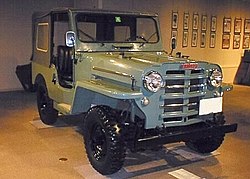 | |
| Overview | |
| Also called | Nissan Patrol |
| Production | 1951-1960 |
| Body and chassis | |
| Class | Mid-size Jeep, Pickup |
| Body style | 3-door Jeep 2-door Pickup fire truck |
| Layout | Front engine, rear-wheel drive |
| Powertrain | |
| Engine | 4.0L P40 I6 NC NBK NAK |
| Transmission | 4-speed(Manual transmission) |
| Series | Body styles | Engines (gasoline) |
|---|---|---|
| 4W60 series (Later named Nissan Patrol) |
SWB: soft top (4W60, 61,65,66) SWB: fire truck (F4W61,65,66) |
NAK/NBK/NC/P |
| Carrier 4W70 |
Troop carrier, weapon carrier | P/P40 |
Second generation (60 series; 1960-1980)
| Second generation | |
|---|---|
 | |
| Overview | |
| Also called | Nissan Patrol |
| Production | 1960–1980 |
| Body and chassis | |
| Class | Mid-size Jeep, Pickup |
| Body style | 3-door Jeep 2-door Pickup fire truck |
| Layout | Front engine, rear-wheel drive |
| Powertrain | |
| Transmission | 4-speed(Manual transmission) |
The soft-top Nissan Patrol 60 (two-door; 2,200 mm (86.6 in) wheelbase) and G60 (two-door; 2,500 mm (98.4 in) wheelbase) were first sold in Australia in 1960. Left-hand drive L60/GL60 models were sold outside of Australia. The 60 series gained attention as the first vehicle to drive across the Simpson Desert in Australia.In 60's the Patrol were brought in US until mid 70's.
| Series | Body styles | Engines (gasoline) |
|---|---|---|
| 60 series | 60:SWB: soft top, hard top G60:LWB:soft top station wagon, van H60:Super LWB:station wagon, van, cab chassis FH60:Super LWB:fire truck |
P40 |
The 4WD Nissan Patrol G60 was produced in short, medium and long wheel-base versions. It had a manual transmission type-F3B83L at first with 3 and latter with 4 speeds, 2 speed transfer case with part-time four wheel drive. The motor was a P40 engine with 3956cc (241.4cu in), inline overhead valve 6 cylinder, features bathtub shaped combustion chambers and fully balanced 7 bearing crank shaft. With 2 doors in front and 1 at back and 4 seats (driver, and companion in front, two parallel back seats) in the long wheel base version, the G60 could have an 8 passenger’s capacity. Other characteristics are: Wheelbase: 2.8m (9 ft 2 in, 110") Load: 1,000 kg (2,205 lb) Bore: 85.7 mm (3.4 in) Stroke: 114.3 mm (4.5 in) Suspension: live-leaf/live-leaf Brakes: drum/drum Tyres: 7.50x16; Fuel tank 64 L (14.1 imp gal; 16.9 US gal) capacity
In 1963, the KG60 (and KGL60) hard-top models were introduced.
JONGA
In the 1960s, the Indian Army showed an interest in two vehicles from the Nissan stable, they were the Nissan Patrol P60 & the Nissan 4W73. The first production units were completed at Vehicle Factory Jabalpur (VFJ) around 1969. The name as per the Indian army records is Jonga, which is an acronym for Jabalpur Ordinance aNd Guncarriage Assembly. It was built at the newly commissioned Vehicle Factory Jabalpur alongside the Nissan 4W73. The first production units were completed at Vehicle Factory Jabalpur (VFJ) around 1969. VFJ was sanctioned in 1965 for the production of three non-fighting vehicles for the Indian military: the 3 ton Shaktiman truck from MAN (Germany), the 4W73 (1 ton Carrier) and quarter ton Nissan Patrol.
Interestingly, both the vehicles from Nissan stable were fitted with the same engines and lots of parts in common.
The Jonga was also briefly sold to civilian customers with a 4.0L Hino diesel engine in 1996, but the demand was low, mostly due to an uncompetitive price, as well as its unappealing looks. Less than two hundred units were sold in all.
Jonga served faithfully until the late 90s, when it was replaced by the lighter Mahindra & Mahindra MM550 jeeps. Many army auctioned pieces have also been scrapped by their subsequent civilian owners, or stretched and converted to people carriers in rural areas. The Jonga is now becoming a rarity.
Third generation (160, 1980–1985; 161, 1985–1987; cab chassis, 1990–1994)
| Third generation | |
|---|---|
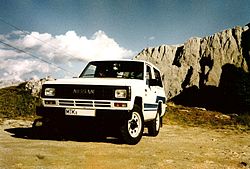 | |
| Overview | |
| Also called | Nissan Patrol |
| Production | 1980–1985 (1986-1994 cab chassis) |
| Body and chassis | |
| Class | Full-size Jeep, Pickup |
| Body style | 5-door Jeep 2-door Pickup 4-door Pickup fire truck |
| Layout | Front engine, rear-wheel drive |
| Powertrain | |
| Engine | 4.0L P40 I6 2.8L L28/L28E I6 3.3L SD33 Diesel 3.3L SD33T Turbodiesel |
| Transmission | 4-speed(Manual transmission) |
Introduced in 1980, replacing 60 series.
| Series | Body styles | Engines (gasoline & Diesel) |
|---|---|---|
| 160 series | 160/161:SWB: soft top, hard top G160/G161:LWB:station wagon, van, cab chassis FG160/FG161:LWB:fire truck |
P40/L28/L28E SD33 |
Fourth generation (260; 1986–1994)
| Fourth generation | |
|---|---|
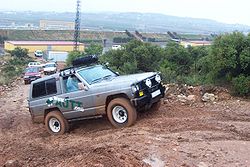 | |
| Overview | |
| Also called | Nissan Patrol |
| Production | 1986–1994 |
| Body and chassis | |
| Class | Full-size SUV, Pickup |
| Body style | 5-door Jeep 2-door Pickup 4-door Pickup |
| Layout | Front engine, rear-wheel drive / four-wheel drive |
| Powertrain | |
| Engine | 4.0L P40 I6 2.8L L28 I6 2.8L RD28T Diesel (MK only) |
| Transmission | 5-speed(Manual transmission) |
| Dimensions | |
| Wheelbase | (LWB) 2,970 mm (116.9 in),(SWB) 2,350 mm (92.5 in) |
| Length | (LWB) 4,690 mm (184.6 in),(SWB) 4,230 mm (166.5 in) |
| Width | (LWB)1,689 mm (66.5 in),(SWB) 1,689 mm (66.5 in) |
| Height | (LWB) 1,980 mm (78.0 in),(SWB) 1,980 mm (78.0 in) |
The 260 series was a Spanish built version of the 160 (Easily spotted by the rectangular headlamps) sold in Europe and was available in SWB / LWB and with L28, SD33 and RD28T engines. The SD engined version, at least in the UK market, had a 24 volt electrical system.
Fifth generation (Y60; 1987–1998)
| Fifth generation | |
|---|---|
| 1995–1997 Nissan Patrol (GQ II) RX (Australia) | |
| Overview | |
| Also called | Nissan Patrol |
| Production | 1987–1998 |
| Body and chassis | |
| Class | Full-size Jeep, Pickup |
| Body style | 5-door 4x4 2-door Pickup 4-door Pickup |
| Layout | Front engine, rear-wheel drive / four-wheel drive |
| Powertrain | |
| Engine | 3.0L RB30S I6 4.2L TB42E I6 4.2L TD42 Diesel 2.8L RD28T Diesel 4.2L TB42S I6 |
| Transmission | 5-speed,4-speed (Automatic transmission, Manual transmission)[clarification needed] |
| Dimensions | |
| Wheelbase | (LWB) 2,970 mm (116.9 in),(SWB) 2,400 mm (94.5 in) |
| Length | (LWB) 4,845 mm (190.7 in),(SWB) 4,285 mm (168.7 in) |
| Width | (LWB) 1,930 mm (76.0 in),(SWB) 1,930 mm (76.0 in) |
| Height | (LWB)1,815 mm (71.5 in),(SWB) 1,810 mm (71.3 in) |
The Y60 was radically different mechanically from its predecessors as it now had coil spring suspension, the rear axle being on a 5 link setup. Most models had a rear Limited slip differential and some variants had vacuum operated manual rear differential lock. The model now had rear disc brakes and some Y60s even had a PTO-driven front mounted winch.
From 1988 to 1994, Ford Australia rebadged the Y60 (GQ) Patrol, as the Ford Maverick. This was a result of the Button car plan devised by the Government of Australia.
Sixth generation (Y61; 1997–2010
| Sixth generation | |
|---|---|
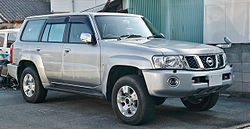 | |
| Overview | |
| Also called | Nissan Patrol |
| Production | 1997-present |
| Body and chassis | |
| Class | Full-size Jeep, Pickup |
| Body style | 5-door SUV 2-door Pickup 4-door Pickup |
| Layout | Front engine, rear-wheel drive / four-wheel drive |
| Powertrain | |
| Engine | 4.8L TB48DE I6 4.5L TB45E I6 4.2L TD42 Diesel 3.0L ZD30DDTi Diesel 2.8L RD28ETi Diesel |
| Transmission | 5-speed,4-speed (Automatic transmission, Manual transmission)[clarification needed] |
| Dimensions | |
| Wheelbase | 2,970 mm (116.9 in) |
| Length | 5,080 mm (200.0 in) |
| Width | 1,940 mm (76.4 in) |
| Height | 1,855 mm (73.0 in) |
Y61 (GU) models first appeared in 1997, only available in 4.5L petrol and 2.8L Turbo Diesel, 3.0L Turbo Diesel, 4.2L diesel, 4.2L Turbo Diesel, 4.2L Turbo Diesel Intercooler variants. In 2002 a new petrol engine was added. A 4.8L inline 6 with new DOHC system, and made 248 hp (185 kW) and over 46 kg⋅m ([convert: unknown unit]) This engine is very famous and popular among UAE tuners, where it could be easily modified and upgraded to levels where it could beat some supercars produced by Lamborghini, Ferrari and other supercar producers. In one occasion a TB48DE engine was fully modified and was able to reach over 2,000 hp (1,491 kW) for the sand hills challenges.
In 2004 a significant facelift model was released. That same year, Nissan stopped selling the Safari in Japan due to poor sales. Nissan also makes a pick up version of the Y61 series with two and four door variations. Although a new model has been launched this Y61 series will still sell for off-road enthusiast but only with few options as a basic trim.
Seventh generation (Y62; 2010–)
| Nissan Patrol | |
|---|---|
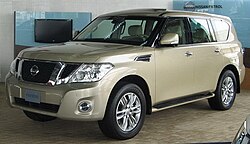 | |
| Overview | |
| Manufacturer | Nissan |
| Production | 2010- |
| Body and chassis | |
| Class | Full-size SUV |
| Body style | 5-door SUV |
| Layout | Front engine, rear-wheel drive / four-wheel drive |
| Related | Infiniti QX56 |
| Powertrain | |
| Engine | 5.6L V8 32-valve VVEL(VK56VD) |
| Transmission | 7-speed automatic |
| Dimensions | |
| Wheelbase | 3,075 mm (121.1 in) |
| Length | 5,140 mm (202.4 in) |
| Width | 1,995 mm (78.5 in) |
| Height | 1,940 mm (76.4 in) |
| Curb weight | 2,785 kg (6,140 lb) |
The all-new 2010 Nissan Patrol was launched on 13 February with the slogan 'Hero of All Terrain', at a VIP event in Abu Dhabi, UAE[1]. It shares the new Infiniti QX56 platform. The 2010 Nissan Patrol is powered by VK56VD (5.6-litre) V8 with a 400 hp (298 kW) an 560 N⋅m (410 ft⋅lbf), with features such as "VVEL" Variable Valve Event and Lift and "DIG" Gasoline direct injection, and mated to a 7-speed automatic. A variable 4×4 Mode package allows switching between four drive modes: sand, on-road, rock and snow, with the flick of a switch. And a "Hydraulic Body Motion Control System" system is available. Also available are an electronic locking rear differential, hill start and hill descent control, as well as lane-departure warning, automatic braking and stability control. It is expected to launch in the US this year, Australia and the rest of the world next year. It will have V6 and V8 turbo diesel engines and a V6 petrol engine.
The Nissan Patrol is offered in three different levels of trim an six different models in the Middle East: LE, SE, and City Package.
Features:
- Intelligent Key - A sensor is triggered when the remote is brought near the vehicle, allowing the user to open it with the touch of a knob.
- Push Start - Start/Stop push button for ignition; a key is not required.
- Curtain Vent - Curtain Vent has several small but highly effective vents mounted in the ceiling above each side window to blow a strong current of cool air down forming a curtain of air that acts as a barrier to heat penetrating the cabin.
- TPMS - The new model employs a revised Tyre Pressure Monitor System (TPMS) with tyre inflation indicator which beeps the horn softly to inform drivers that a suitable tyre pressure has been reached.
- ALL MODE 4x4 system Four-wheel drive - Allows the driver to quickly switch between four drive modes: sand, on-road, snow and rock, with the flick of a switch. In sand mode, owners are able to drive safely, quickly and skillfully in sand and dirt, just like professional rally drivers.
- Hydraulic Body Motion Control System - The new Patrol employs HBMC with 4-wheel independent suspension.
- Intelligent Cruise Control (Cruise control) -Slows your vehicle to maintain the desired distance between you and slow traffic, and re-accelerates to your pre-set speed and distance as the traffic flow picks up. Distance Control Assist. Helps the driver release the throttle and applies brakes as needed in slowing traffic.
- Around View Monitor - When a Patrol journey comes to an end, much against your wish, the 4 cameras of the AVM come alive to help you park the vehicle even in the tightest of spots.
- 9.3 GB Music Box Hard Drive - Enjoy your personal music library. With the category’s first "Music Box", you can record close to 2,900 songs up to 9.3 GB storage. Connects to iPod®, USB flash drive and other compatible device.
- Hill Start Assist & Hill Descent Control system - Sail through the ups & downs. The advanced system assists you in both climbing and descending from a slope by controlling the brakes and adjusting the vehicle speed.
- Locking differential - The available electronic locking rear differential allows you to pull out of mud or loose sand by distributing torque evenly to the rear wheels.
- (LDWS) Lane Departure Warning System - The system helps avoid unintended lane departure. LDW warns the driver with an alarm and an indicator to brake. LDP assists the driver to bring the vehicle back to the lane by applying the brake.
- Intelligent Brake Assist - If the driver doesn’t respond to the warning, and a collision cannot be avoided, IBA automatically engages the brakes to help reduce collision speed and impact, mitigating the consequences of the accident.
- Vehicle Dynamic Control (Electronic stability control) - Combines with Traction Control System and Brake LSD (Limited Slip Differential) functions to automatically prevent the Patrol from sliding sideways on slippery road surfaces when changing lanes or negotiating a curve.[2]
References
- ^ http://www.nissan-global.com/EN/NEWS/2010/_STORY/100213-01-e.html Nissan Patrol new class-leader as Nissan's 'Hero of All Terrain'
- ^ "Nissan Patrol 2010 launched in Abu Dhabi". DriveArabia.com. 2010-02-14. Retrieved 2010-02-20.
External links
![]() Media related to Nissan Patrol at Wikimedia Commons
Media related to Nissan Patrol at Wikimedia Commons
![]() Media related to Nissan Safari at Wikimedia Commons
Media related to Nissan Safari at Wikimedia Commons
